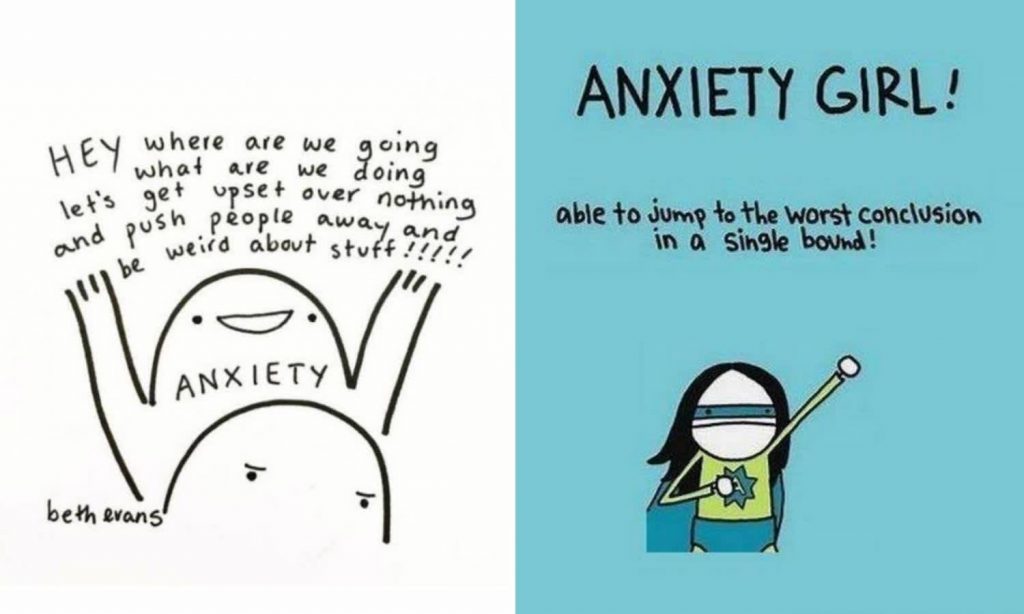I’m an open book. There’s no subject that I find difficult to talk about and there’s not much that I hide from anyone.
While some people might find this confronting, others find solace in my honesty, and often it provides a springboard for conversation, especially when it comes to the topic of mental health.
Earlier this year when I started dating my boyfriend, it was extremely important to me that I continued the trend of opening up. I’m in my mid-30s, and I needed to be as upfront as possible about who I was because that’s exactly who he was getting.
While previous men had found my honesty unnerving, talking about my mental health was as important as what I liked to do on the weekends. Although I didn’t stick it on my Bumble profile once I realised that this guy was sticking around, I knew the wheels would soon enough fall off if I didn’t come clean.
About a month in I experienced extreme and ongoing anxiety based on what I now know is Relationship Obsessive Compulsive Disorder. And while my boyfriend has been through every facet of this a million times in the past seven months, it was the first time that he had experienced it with me.
Now, contrary to what people may think, not everyone is aware or has knowledge of what mental health can do to someone, particularly when it comes to anxiety. My boyfriend, who is probably the most chill person I know, had never seen anything like it before and wasn’t sure what to do.
Instead of fighting with him, I asked if he would read some articles about how to love someone with mental health. He agreed.
To make it less daunting (because it can be so challenging for anyone who hasn’t had to deal with it before) I also sent him some funny memes about what it feels like to live with anxiety.

I found that by sharing information about what I was going through, has helped him understand what happens when I am feeling anxious and what he can do to help.
Now, when I behave irrationally or get too emotional, he has a gauge on what is going on. Don’t get me wrong, there are times when I’m a punish, but overall it has really helped our relationship grow.
According to the Black Dog Institute, one in five (20%) Australians aged 16-85 experience mental illness in any year. Mental health can affect how people feel, think, behave and relate to others.
Life Coach Leigh Louey-Gung has been helping people form stronger relationships through tackling their mental health challenges since 2006. He says that communicating what you are feeling is a powerful first step.
“While it’s great to share how you’re feeling in any moment, it’s also equally important to understand why you feel the way you do as well as finding productive solutions for your challenges,” he said in an interview with The Latch.
“Without an awareness of what you want and how you can improve your mental health, most conversations will not improve the quality of your life.”
Louey also believes that educating your partner will not only help you but will have a profound impact on their mental health and the “success of your relationship”.
“If you’ve committed to building a relationship with them then you need to educate them on any issues that may prevent the success of your relationship,” he says.
If you have someone in your life who you want to talk about your mental health with, here’s a few tips on how to get the conversation started.
☆ Understand your own mental health first
“It’s critical to understand your own mental health challenges before talking to your partner because you need to clearly communicate your issues and challenges to get the support you want,” Louey-Gung says.
“Your partner will most likely want to help but until you can clearly communicate what you’re dealing with and what you want to happen, their efforts and intentions are going to be wasted.”
☆ Know your family history
According to Louey, majority of thought patterns and processes you use are formed before the age of four.
“If there is a history of mental health challenges in your family, especially when you were a young child, they will have most likely shaped the way you think and see the world.”
☆ Find a comfortable way to share the information
“The best way to talk to someone about your mental health is to let them know that you need to have a serious conversation about some mental health issues and ask them to set aside some time in the near future to talk,” Louey-Gung suggests.
“That way, they’ll be able to clear their schedule and their brain space and give you the full attention that conversations of this magnitude deserve.”
☆ Consider your partner’s perspective and answer any questions they may have
Listening to your partner’s perspective will be able to give you an objective opinion on any situation you are struggling with.
“It’s important to answer their questions because they’ll want to support you in any way they can and if you don’t answer their questions, they won’t be able to support you in the way you need,” Louey-Gung says.
☆ Share how you’re feeling — the good and the bad
Being honest and having clear communication is “critical” for building trust and connection.
“Without open communication channels, your partner will start to second-guess themselves, your feelings, and your relationship, which can lead to all kinds of relationship challenges.”
Leigh Louey-Gung helps people create happiness on demand through his website Life Operating System.
If you or someone you know needs help, please contact BeyondBlue on 1300 224 636 or Lifeline on 13 11 14.







